
第39章 CHAPTER Religion(4)
The argument in the case may be put thus. Have specially religions races been proportionally truth-telling ones? If not, has there been any other cause at work in the development of mankind tending to increase veracity? The answer to the first question has all the simplicity of a plain negative. No such pleasing concomitance of characteristics is observable to-day, or has been presented in the past. Permitting, however, the dead past to bury its shortcomings in oblivion, let us look at the world as we find it. We observe, then, that the religious spirit is quite as strong in Asia as it is in Europe; if anything, that at the present time it is rather stronger. The average Brahman, Mahometan, or Buddhist is quite as devout as the ordinary Roman Catholic or Presbyterian. If he is somewhat less given to propagandism, he is not a whit less regardful of his own salvation. Yet throughout the Orient truth is a thing unknown, lies of courtesy being de rigueur and lies of convenience de raison; while with us, fortunately, mendacity is generally discredited. But we need not travel so far for proof. The same is evident in less antipodal relations. Have the least religious nations of Europe been any less truthful than the most bigoted? Was fanatic Spain remarkable for veracity? Was Loyola a gentleman whose assertions carried conviction other than to the stake? Were the eminently mundane burghers whom he persecuted noted for a pious superiority to fact? Or, to narrow the field still further, and scan the circle of one's own acquaintance, are the most believing individuals among them worthy of the most belief? Assuredly not.
We come, then, to the second point. Has there been any influence at work to differentiate us in this respect from Far Orientals?
There has. Two separate causes, in fact, have conduced to the same result. The one is the development of physical science; the other, the extension of trade. The sole object of science being to discover truth, truth-telling is a necessity of its existence.
Professionally, scientists are obliged to be truthful. Aliter of a Jesuit.
So long as science was of the closet, its influence upon mankind generally was indirect and slight; but so soon as it proceeded to stalk into the street and earn its own living, its veracious character began to tell. When out of its theories sprang inventions and discoveries that revolutionized every-day affairs and changed the very face of things, society insensibly caught its spirit.
Man awoke to the inestimable value of exactness. From scientists proper, the spirit filtered down through every stratum of education, till to-day the average man is born exact to a degree which his forefathers never dreamed of becoming. To-day, as a rule, the more intelligent the individual, the more truthful he is, because the more innately exact in thought, and thence in word and action.
With us, to lie is a sign of a want of cleverness, not of an excess of it.
The second cause, the extension of trade, has inculcated the same regard for veracity through the pocket. For with the increase of business transactions in both time and space, the telling of the truth has become a financial necessity. Without it, trade would come to a standstill at once. Our whole mercantile system, a modern piece of mechanism unknown to the East till we imported it thither, turns on an implicit belief in the word of one's neighbor. Our legal safeguards would snap like red tape were the great bond of mutual trust once broken. Western civilization has to be truthful, or perish.
And now for the spirits of the two beliefs.
The soul of any religion realizes in one respect the Brahman idea of the individual soul of man, namely, that it exists much after the manner of an onion, in many concentric envelopes. Man, they tell us, is composed not of a single body simply, but of several layers of body, each shell as it were respectively inclosing another. The outermost is the merely material body, of which we are so directly cognizant.
This encases a second, more spiritual, but yet not wholly free from earthly affinities. This contains another, still more refined; till finally, inside of all is that immaterial something which they conceive to constitute the soul. This eventual residuum exemplifies the Franciscan notion of pure substance, for it is a thing delightfully devoid of any attributes whatever.
We may, perhaps, not be aware of the existence of such an elaborate set of encasings to our own heart of hearts, nor of a something so very indefinite within, but the most casual glance at any religion will reveal its truth as regards the soul of a belief. We recognize the fact outwardly in the buildings erected to celebrate its worship.
Not among the Jews alone was the holy of holies kept veiled, to temper the divine radiance to man's benighted understanding. Nor is the chancel-rail of Christianity the sole survivor of the more exclusive barriers of olden times, even in the Western world.
In the Ear East, where difficulty of access is deemed indispensable to dignity, the material approaches are still manifold and imposing.